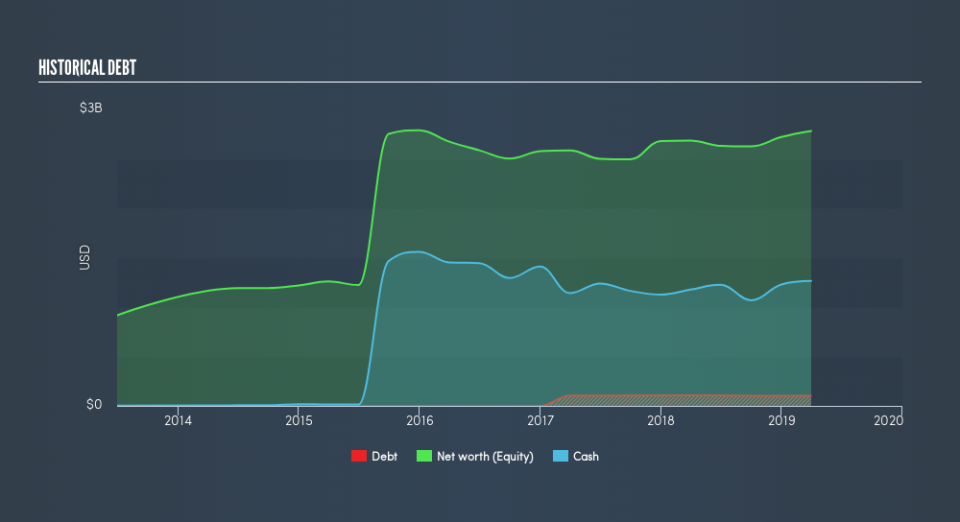Is Madison Square Garden (NYSE:MSG) A Risky Investment?

Howard Marks put it nicely when he said that, rather than worrying about share price volatility, 'The possibility of permanent loss is the risk I worry about... and every practical investor I know worries about.' So it seems the smart money knows that debt - which is usually involved in bankruptcies - is a very important factor, when you assess how risky a company is. We note that The Madison Square Garden Company (NYSE:MSG) does have debt on its balance sheet. But the more important question is: how much risk is that debt creating?
When Is Debt Dangerous?
Generally speaking, debt only becomes a real problem when a company can't easily pay it off, either by raising capital or with its own cash flow. Ultimately, if the company can't fulfill its legal obligations to repay debt, shareholders could walk away with nothing. However, a more frequent (but still costly) occurrence is where a company must issue shares at bargain-basement prices, permanently diluting shareholders, just to shore up its balance sheet. Of course, the upside of debt is that it often represents cheap capital, especially when it replaces dilution in a company with the ability to reinvest at high rates of return. When we think about a company's use of debt, we first look at cash and debt together.
View our latest analysis for Madison Square Garden
What Is Madison Square Garden's Debt?
As you can see below, Madison Square Garden had US$103.1m of debt, at March 2019, which is about the same the year before. You can click the chart for greater detail. However, its balance sheet shows it holds US$1.26b in cash, so it actually has US$1.16b net cash.
A Look At Madison Square Garden's Liabilities
Zooming in on the latest balance sheet data, we can see that Madison Square Garden had liabilities of US$780.8m due within 12 months and liabilities of US$356.9m due beyond that. Offsetting these obligations, it had cash of US$1.26b as well as receivables valued at US$229.7m due within 12 months. So it actually has US$356.0m more liquid assets than total liabilities.
This surplus suggests that Madison Square Garden has a conservative balance sheet, and could probably eliminate its debt without much difficulty. Simply put, the fact that Madison Square Garden has more cash than debt is arguably a good indication that it can manage its debt safely.
Although Madison Square Garden made a loss at the EBIT level, last year, it was also good to see that it generated US$17m in EBIT over the last twelve months. The balance sheet is clearly the area to focus on when you are analysing debt. But it is future earnings, more than anything, that will determine Madison Square Garden's ability to maintain a healthy balance sheet going forward. So if you're focused on the future you can check out this free report showing analyst profit forecasts.
Finally, while the tax-man may adore accounting profits, lenders only accept cold hard cash. Madison Square Garden may have net cash on the balance sheet, but it is still interesting to look at how well the business converts its earnings before interest and tax (EBIT) to free cash flow, because that will influence both its need for, and its capacity to manage debt. In the last year, Madison Square Garden created free cash flow amounting to 17% of its EBIT, an uninspiring performance. That limp level of cash conversion undermines its ability to manage and pay down debt.
Summing up
While we empathize with investors who find debt concerning, you should keep in mind that Madison Square Garden has net cash of US$1.2b, as well as more liquid assets than liabilities. So we are not troubled with Madison Square Garden's debt use. Over time, share prices tend to follow earnings per share, so if you're interested in Madison Square Garden, you may well want to click here to check an interactive graph of its earnings per share history.
When all is said and done, sometimes its easier to focus on companies that don't even need debt. Readers can access a list of growth stocks with zero net debt 100% free, right now.
We aim to bring you long-term focused research analysis driven by fundamental data. Note that our analysis may not factor in the latest price-sensitive company announcements or qualitative material.
If you spot an error that warrants correction, please contact the editor at editorial-team@simplywallst.com. This article by Simply Wall St is general in nature. It does not constitute a recommendation to buy or sell any stock, and does not take account of your objectives, or your financial situation. Simply Wall St has no position in the stocks mentioned. Thank you for reading.

 Yahoo Finance
Yahoo Finance 
